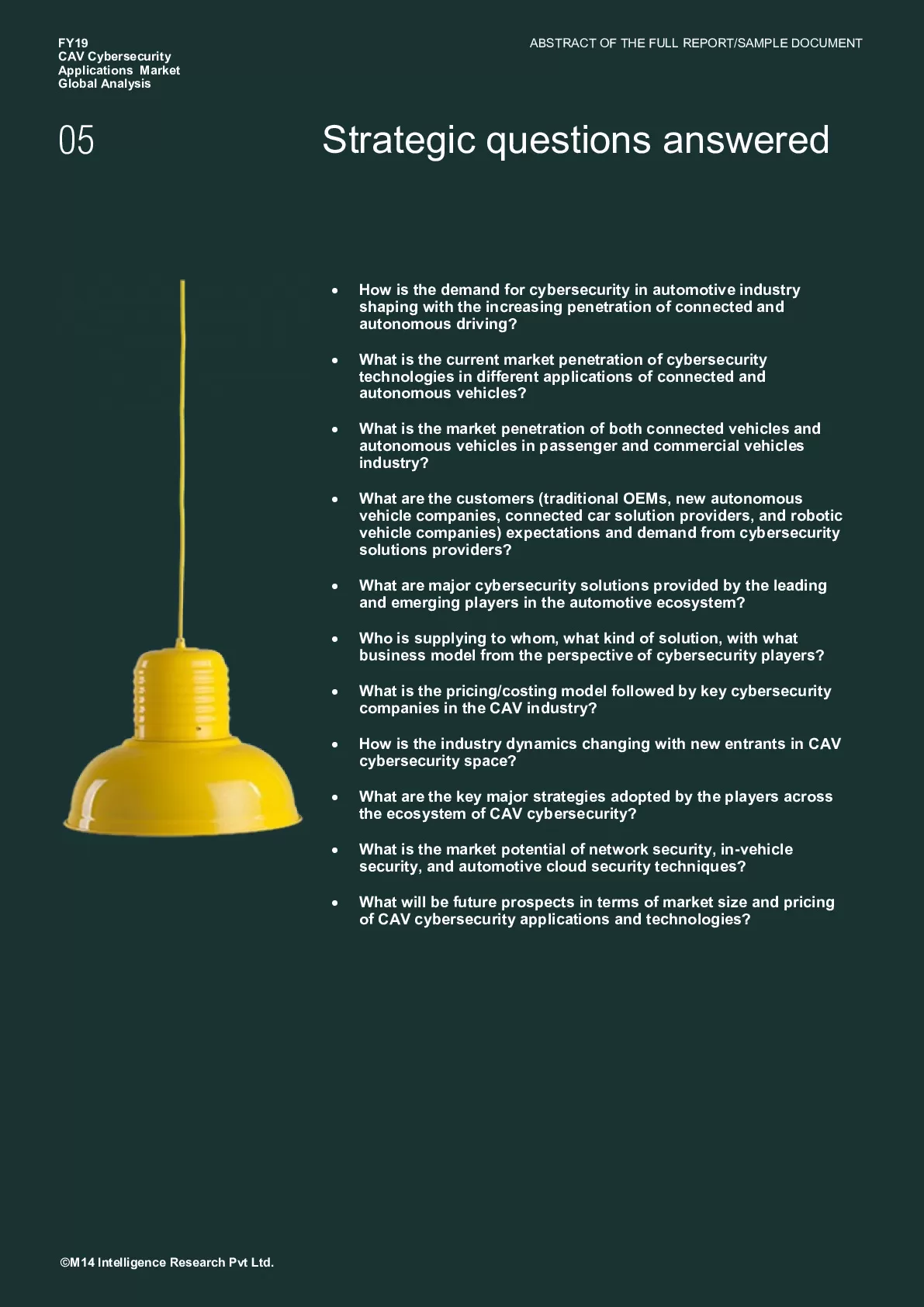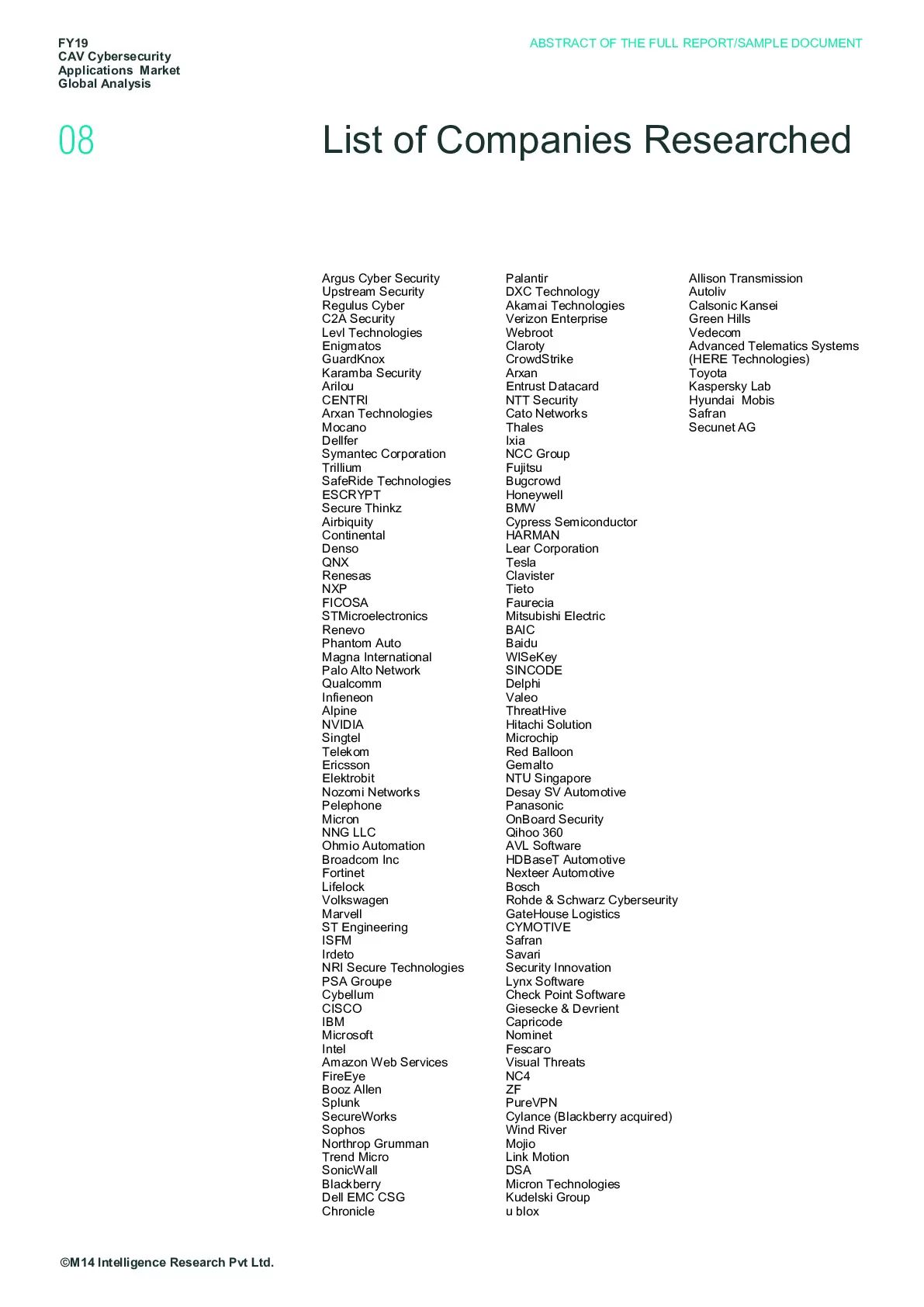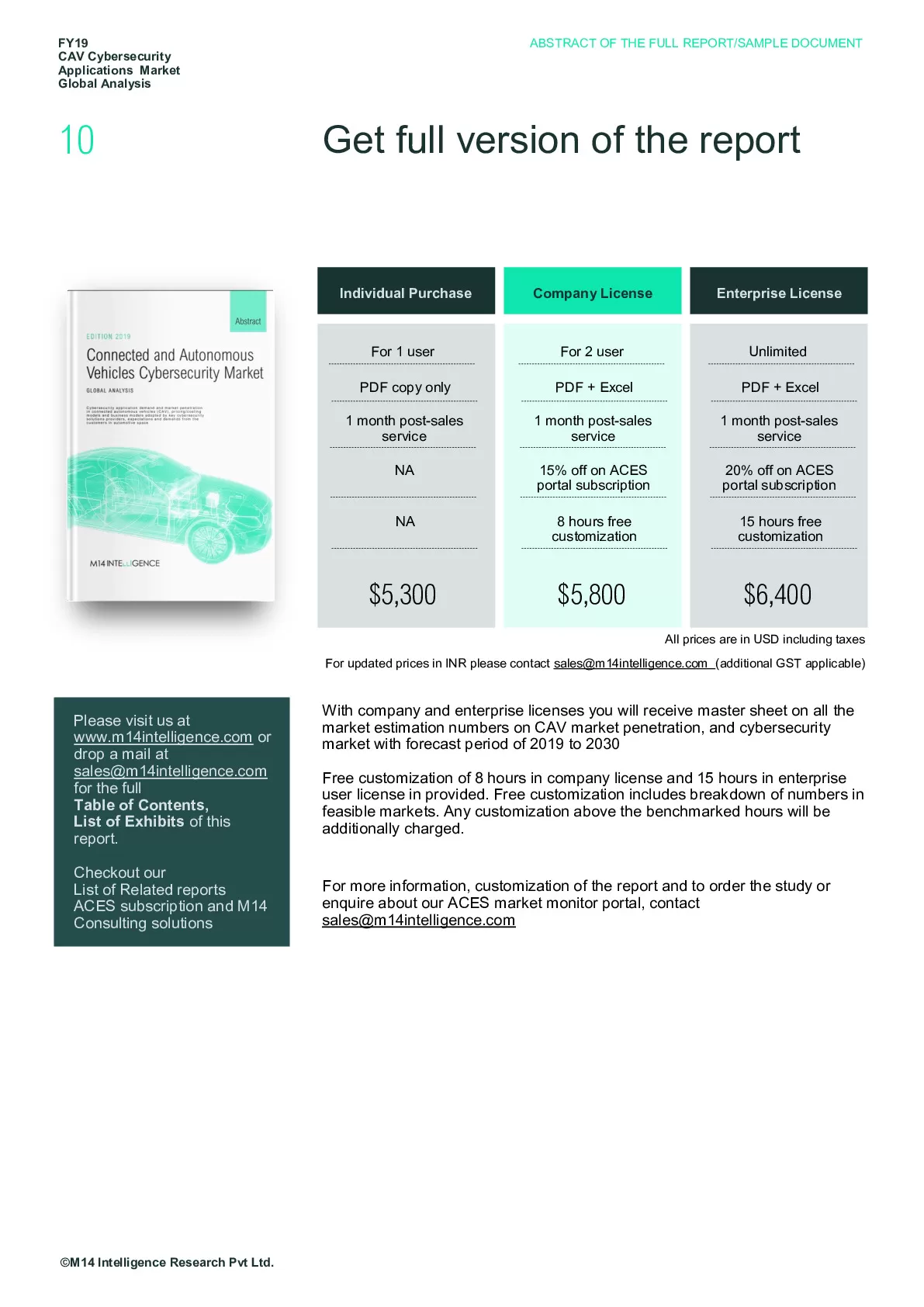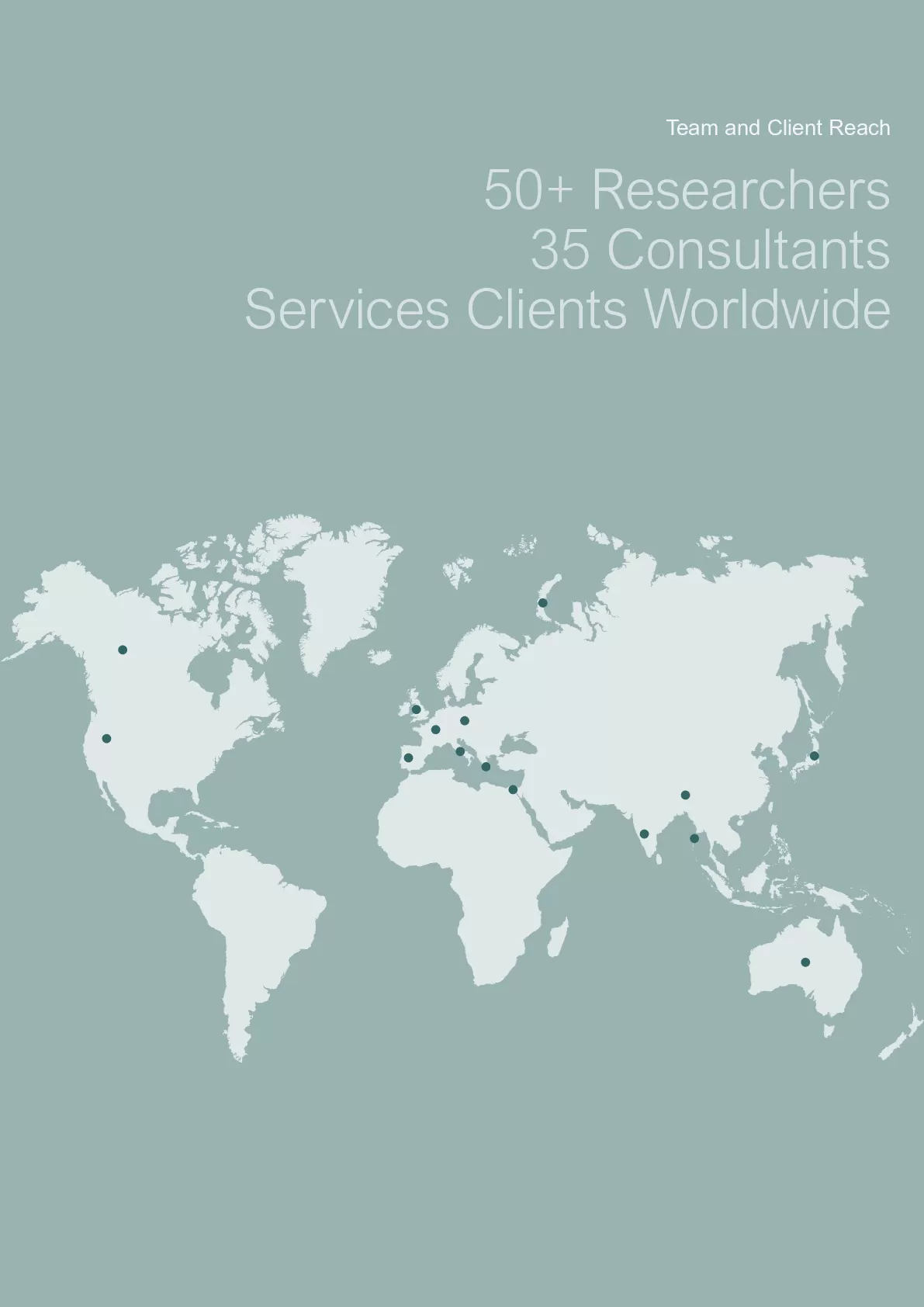Connected Autonomous Vehicles Cybersecurity Market, Edition 2019
Cybersecurity application demand and market penetration in connected autonomous vehicles (CAV), pricing/costing models and business models adopted by key cybersecurity solutions providers, expectations and demands from the customers in automotive space
Published: 05 Dec 2019

Key Highlights
- More than 100 players researched across the ecosystem
- Market analysis and forecasts till 2030
- Deep-dive analysis of 20+ cybersecurity players and new entrants
- 30+ detailed interviews conducted with players across the ecosystem
- 100+ data tables and 50+ infographics with precise market insights
- Pricing/costing and business models of key cybersecurity players discussed
- Key customer preferences and demand analysis showcased

Exhaustive Coverage
Market potential for network security, in-vehicle security, and automotive cloud security applications of cybersecurity
CAV cybersecurity application like safety system, infotainment, telematics, onboard diagnostics, and communication are discussed in-depth from market point of view
Closely researched the cybersecurity applications expectations and interests of key customers in the automotive ecosystem
Discussed the pricing/costing model adopted by leading cybersecurity players especially in the CAV industry so as to quickly monetize the growth
Researched and talked about the technologies that are cost and time effective in terms of implementation for minimizing the cyberattack risks
Report also talks about the market penetration and sales forecast of connected and autonomous vehicles in the passenger and commercial vehicles industry
Market Overview
Key Questions Answered
- How is the demand for cybersecurity in automotive industry shaping with the increasing penetration of connected and autonomous driving?
- What is the current market penetration of cybersecurity technologies in different applications of connected and autonomous vehicles?
- What is the market penetration of both connected vehicles and autonomous vehicles in passenger and commercial vehicles industry?
- What are the customers (traditional OEMs, new autonomous vehicle companies, connected car solution providers, and robotic vehicle companies) expectations and demand from cybersecurity solutions providers?
- What are major cybersecurity solutions provided by the leading and emerging players in the automotive ecosystem?
- Who is supplying to whom, what kind of solution, with what business model from the perspective of cybersecurity players?
- What is the pricing/costing model followed by key cybersecurity companies in the CAV industry?
- How is the industry dynamics changing with new entrants in CAV cybersecurity space?
- What are the key major strategies adopted by the players across the ecosystem of CAV cybersecurity?
- What is the market potential of network security, in-vehicle security, and automotive cloud security techniques?
- What will be future prospects in terms of market size and pricing of CAV cybersecurity applications and technologies?
List of Companies





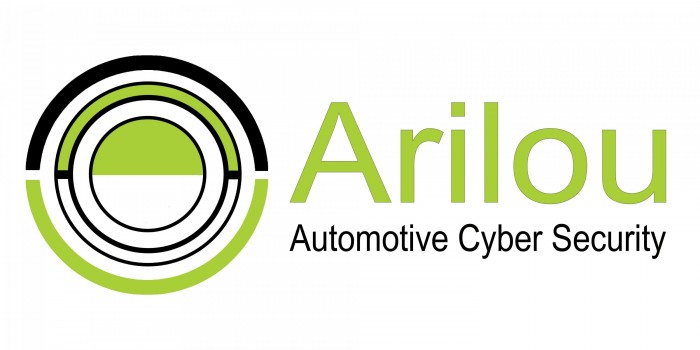















*not an exclusive list - please download the sample for more info
Purchase the study
Individual Purchase
- For 1 user
- PDF copy only
- 1 month post-sales service
- NA
- NA
Company License
- For 2 users
- PDF + Excel
- 1 month post-sales service
- 15% Off on ACES portal subscription
- 8 hours free customization
Enterprise License
- Unlimited Users
- PDF + Excel
- 1 month post-sales service
- 20% Off on ACES portal subscription
- 15 hours free customization
Do you have any specific need?
Let us know your specific requirements
Contact ussales@m14intelligence.com | Worldwide Sales: +1 323 522 4865
Or request a call back !
Related Products
Published : 09 Jun 2025
In-cabin and Exterior Sensing Applications of 4D imaging radar in ADAS and Autonomous Vehicles; 60 GHz, 76–81 GHz, and 140 GHz Band, SAE Level 2+ and ...
Published : 22 Apr 2025
Comprehensive Analysis of Service-Oriented Architecture (SOA), Over-the-Air (OTA) Updates, and Edge Computing in SDVs, Market Estimation and Forecasts...
Published : 28 Mar 2025
Lithium-ion (LFP and NMC) and Emerging Battery Technology (Solid-state and Sodium-ion) Market Sizing, Regional breakdown, Regulatory Policies, Battery...
Published : 05 Mar 2025
Driver Monitoring System (DMS) and Occupant Monitoring System (OMS) using Infrared (NIR), 3D sensing (VCSEL in ToF), Wide-angle Cameras, and Radar; in...
Published : 25 Nov 2024
Market Penetration & Sales Demand of Type of AMR - Inventory Transportation Robots, Picking Robots, Sortation Robots, And Drones for Inventory Managem...
Published : 04 Apr 2023
Autonomous Highway Trucks, Autonomous On-Road Vehicles, Sidewalk Robots/Droid, Market Penetration & Sales Demand, Consumer Analysis, Sensor Content (...
Published : 15 Mar 2023
Inventory Transportation Robots, Picking Robots, Sortation Robots, Collaborative Robots, And Drones; Market Penetration & Sales Demand; Market By Busi...
Published : 10 Aug 2021
In-cabin and Exterior Sensing Applications of 4D imaging radar in ADAS and Autonomous Vehicles; Emerging 4D imaging players competition assessment
Published : 02 Jun 2021
Future of AI powered autonomous precision farming using agriculture robots; RaaS vs equipment sales; driverless tractors; computer vision image recogn...
Published : 21 Apr 2021
Mobile Robots, Sensing, Mapping and Localization Technologies, and Warehouse Automation Solutions Market Analysis, Forecast, and Automation Industry A...
Published : 09 Apr 2021
Container Terminal Automated Equipment, Sensing Technologies, Automation Solutions, and Services Market Analysis and Forecast, Company Assessment, Ind...
Published : 06 Apr 2021
Analysis of 150+ LiDAR companies and total addressable market in the field on ADAS, AVs, Robotaxis, Shuttles, Pods, Construction & Mining, Ports & Con...
Published : 22 Feb 2021
Active Driver monitoring and Occupant Monitoring System using NIR camera and mmW Radar; in-cabin 3D sensing market for ADAS and autonomous vehicles; O...
Published : 14 Oct 2020
Estimated automotive-grade LiDAR mass production timelines, expected pricing at high-volumes, & preferred technology by the leading OEM-Tier1-LiDAR su...
Published : 14 Jul 2020
ADAS and AV development, testing, verification, and validation with Image, Video, Data Annotation, Ground Truth Labelling, Automation Software and Man...
Published : 03 Jun 2020
ADAS and autonomous vehicles enablers shipment, market size, and pricing forecast breakdown by levels of autonomy – camera, LiDAR, radar, V2X, HA GNSS...
Published : 13 Jan 2020
Autonomous vehicles launch timelines by OEMs & robotic vehicle companies (robotaxi, shuttles, pods, long-haul platooning trucks); market penetration &...
Published : 09 Dec 2019
3D sensing camera modules and subcomponents (VCSEL, CMOS image sensor, optics, 3D system design and computing) market penetration, size, shipment, and...
Published : 05 Dec 2019
Cybersecurity application demand and market penetration in connected autonomous vehicles (CAV), pricing/costing models and business models adopted by ...
Published : 03 Sep 2019
Expected mass production timelines of LiDAR for autonomous driving, target cost, LiDAR technologies analysis, LiDAR supplier’s competition assessment ...
Published : 10 Jul 2019
Penetration & Sales Demand (Level 1+2; Level 3 – Highway Autopilot & Long-haul Platooning; Level 4 – Highway Autopilot, Park Assist, Urban Autopilot –...
Published : 15 Sep 2018
Expected mass production timelines of LiDAR for autonomous driving, target cost, LiDAR technologies analysis, LiDAR supplier’s competition assessment ...
Published : 11 Jun 2018
Low & ultra-low power energy harvesting microcontrollers for wearables, medical devices, connected homes, precision agriculture, & smartphones. Blueto...
Published : 25 Jan 2018
Penetration & Sales Demand (Level 1+2; Level 3 – Highway Autopilot & Long-haul Platooning; Level 4 – Highway Autopilot, Park Assist, Urban Autopilot –...

.png)




